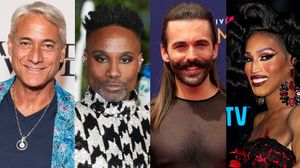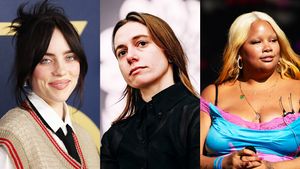Protesters
already have torched Dutch flags in Afghanistan ahead of a
new Dutch film portraying Islam's holy book as a
''fascist'' text that incites violence and preaches
the oppression of women and gays.
A Dutch Cabinet
minister postponed his trip to Somalia on Friday due to
''specific threats'' linked to the film, and the Dutch
government has urged lawmaker Geert Wilders to scrap
his film for the safety of its citizens abroad.
But Wilders said
Monday he has begun negotiations with Dutch broadcasters
about airing the 15-minute film, Fitna. He said
he will only allow them to show it in its entirety, and if
they refuse, he plans to show it to the media and post
it on the Internet.
''We have never
learned to be intolerant toward people who are intolerant
toward us, toward cultures that are intolerant toward us,''
he said in a recent Associated Press interview.
The right-wing
legislator previously warned of a ''tsunami'' of Islam
swamping the Netherlands and said Muslims should tear up
half of the Koran if they want to live here.
Wilders has lived
under round-the-clock security since the 2004 murder of
filmmaker Theo van Gogh by an Islamic radical enraged by his
short film, Submission, a fictional study of
abused Muslim women with scenes of near-naked women
with Koranic texts engraved on their flesh.
The film
Fitna, an Arabic word meaning "discord," puts
the centuries-old Dutch traditions of religious
tolerance and freedom of speech on a collision course.
If it airs, Dutch
Muslims are expected to file criminal complaints for
racial or religious vilification. Prosecutors would then
have to decide whether to charge Wilders with any
offense.
''Our law is very
clear: Anybody can make a film. We have freedom of
expression, and you cannot restrict that,'' says
Moroccan-born Sadik Harchaoui, chief of the Forum
Institute for Multicultural Development.
''Can you offend
people? The answer is yes. I'm not saying you should do
it or it is desirable, but you can,'' he added. ''But if the
film is insulting and preaches hate, then the law has
to take action.''
The Dutch
government says it cannot ban the film but is attempting to
distance itself from Wilders, the leader of the Freedom
Party, which holds nine of parliament's 150 seats.
''It is our
responsibility to make clear to everyone that the views and
actions of this one elected representative are not those of
the government,'' Prime Minister Jan Peter Balkenende
told reporters last week. ''We defend the core values
of freedom and respect. We guarantee freedom of
expression and of religion, for Muslims as for everyone
else.''
Already the film
has provoked reactions from Damascus, Tehran, and other
capitals of predominantly Muslim countries.
Pakistan's
government ordered Internet providers to restrict access to
YouTube, allegedly to prevent Pakistanis from accessing a
clip of Wilders in which he makes derogatory remarks
about Islam. The move inadvertently caused a brief
worldwide outage of the video sharing site.
In Afghanistan
protesters set fire to Dutch flags over the weekend and
Islamic clerics called for the withdrawal of Dutch troops.
The North
Atlantic Treaty Organization's Dutch secretary-general, Jaap
de Hoop Scheffer, says he too is worried about the
''potentially serious consequences'' for alliance
troops in Afghanistan, where 1,500 Dutch troops serve
in the NATO-led force in the volatile south.
''If they are put
in the line of fire because of the film, I am
concerned,'' he told Dutch television news show Buitenhof.
De Hoop Scheffer
says people around the world, including some in the U.S.
administration, have been asking him about the film.
So far the
reaction among the 850,000 Muslims living in this country of
16 million has been muted, but the Dutch government has
warned municipalities to be on alert for rioting if
and when the film appears.
The moderate
National Moroccan Council has said it is trying to
''neutralize the threat'' posed by the film but cannot rule
out violence at home.
''We will have
succeeded if, after the film, Mr. Wilders is frustrated,''
chairman Mohamed Rabbae said at a news conference in
January. ''If he sees there are no riots and Muslims
are cleverer and more democratic than he thinks.''
(AP)


















































































